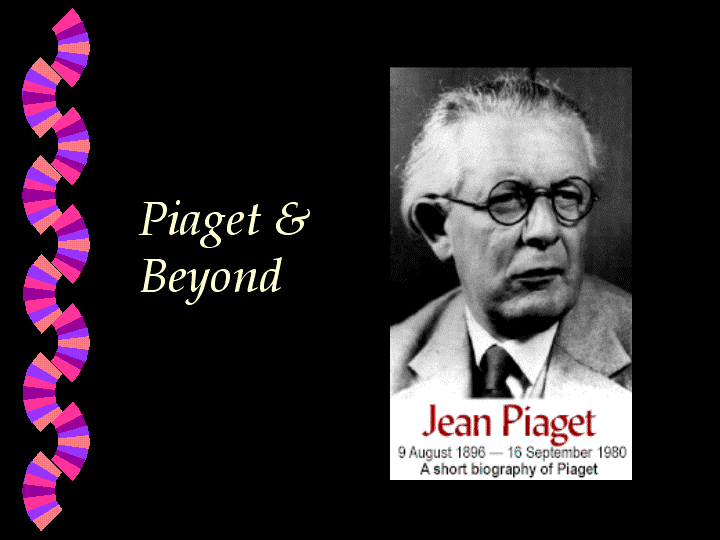

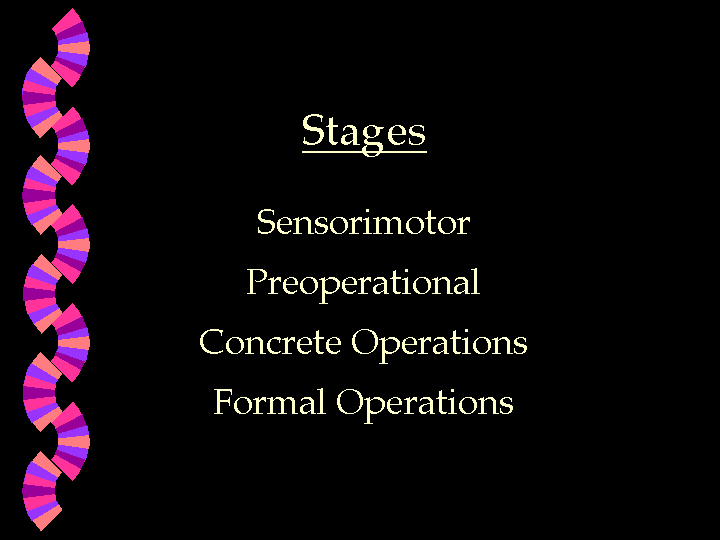
Piaget proposed four broad stages of cognitive development:
Sensorimotor - From birth to approximately 2 years
Preoperational - From approximately 2 years to 5/7 years of age
Concrete Operations - From 5/7 years of age to 13/15 years of age
Formal Operations - From 13/15 years through adulthood
For more information, go to the Jean Piaget Society
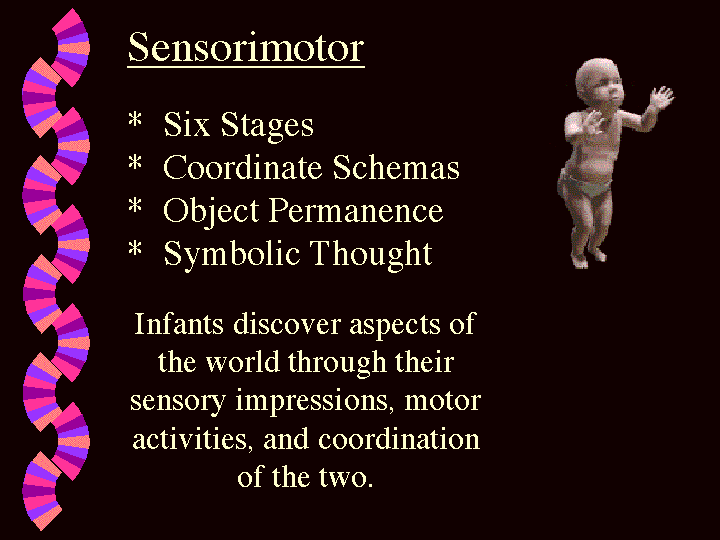
1. The sensorimotor stage is composed of six substages. Your text provides a discussion of these stages.
2. As a child moves through the stages, they begin to coordinate schemas. In the sensorimotor stage, schemas are sensory and motor in nature. Thus, there is sensory schemas such a vision or audition and there are motor schemas which are at the beginning primarily reflexive such as the grasping schema and the sucking schema. As these schema become coordinated, an infant will look towards the source of a sound and put into their mouth that which they have just grasped such as their toe.
3. They will gradually develop object permanence - knowing something continues to exist even if it is out of sight. Thus, while peek-a-boo may be fascinating for a young baby, once object permanence is established, it becomes a tad boring. Note that object permanence occurs after attachment is established and this disparity is one explanation for the separation anxiety seen at six months of age.
4. By the end of the sensorimotor period, symbolic thought established. The major form of symbolic thought attained is language but we also see it in pretend play, art, fantasy, deferred imitation (repeating the tantrum they saw at a friends house), etc.
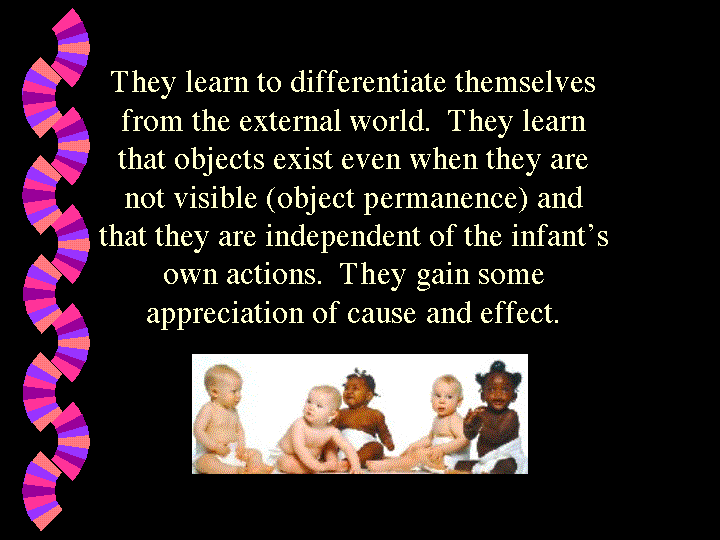
5. Infants will begin to see the world as separate from themselves. As part of that process they begin to establish cause and effect. This is most often seen by the repeated throwing of toys onto the floor in a restaurant and the infant's keen attention to parental retrieval of these toys.
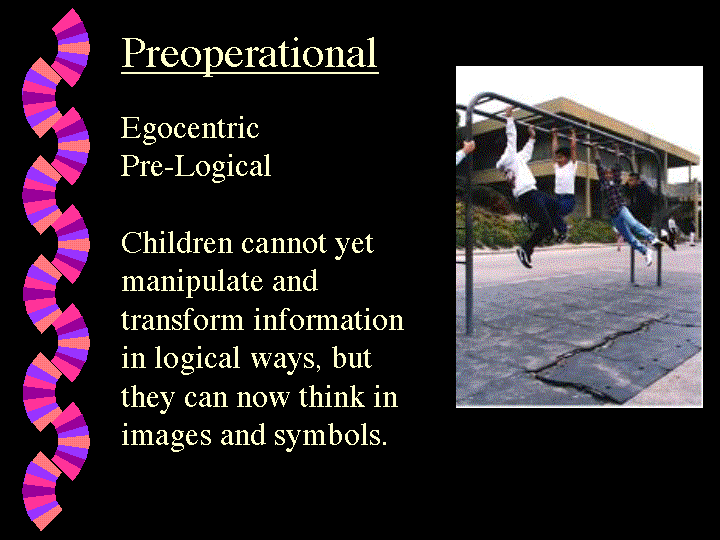
The word "operational" can be loosely translated as possessing logical thought. Thus, preoperational children are pre-logical. Some characteristics of preoperational children:
1. Egocentric - they can not place themselves in someone else's shoes. Thus, a five year old will give their mother what kind of present?
A child hits another child on the playground. The teacher says, "Tell him you are sorry". The child refuses. The teacher asks, "How do you think he felt when you hit him?" The child responds, "I don't know". The teachers asks, "How would you feel if he hit you?" The child answers, "Mad and hurt". "Well, how do you think your friend felt when you hit him?" And the child states, "I don't know". Is this child just being difficult?
2. Child lacks the ability to conserve - can not understand that specific properties of objects (height, weight, volume, length) remain the same despite apparent changes in the shape or arrangement of those objects.
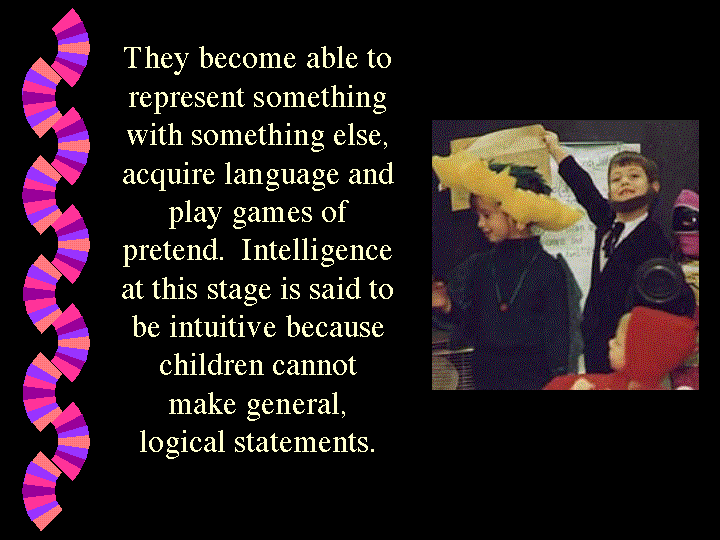
3. They have symbolic thought as discussed previously.
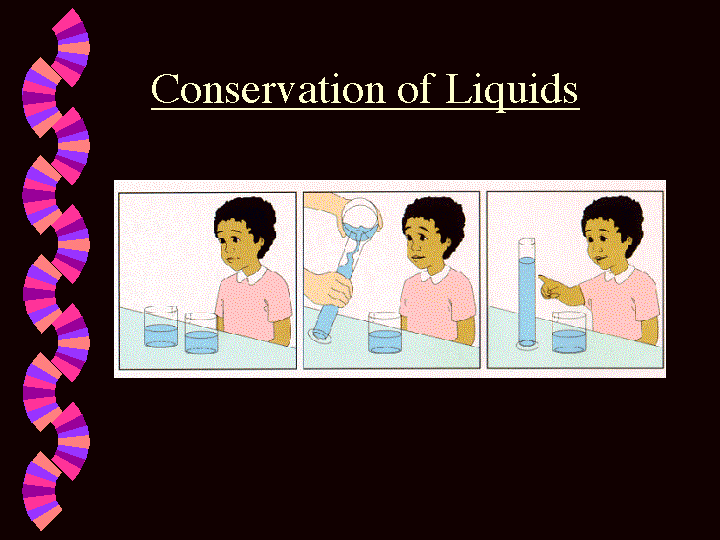
Classic conservation task. Preoperational children base their decisions on what appears to now hold more. Preoperational children center on one aspect of a problem at a time. They focus on its current state as opposed to taking into account the recent transformation. Finally, they tend to see things as irreversible and unchangeable.
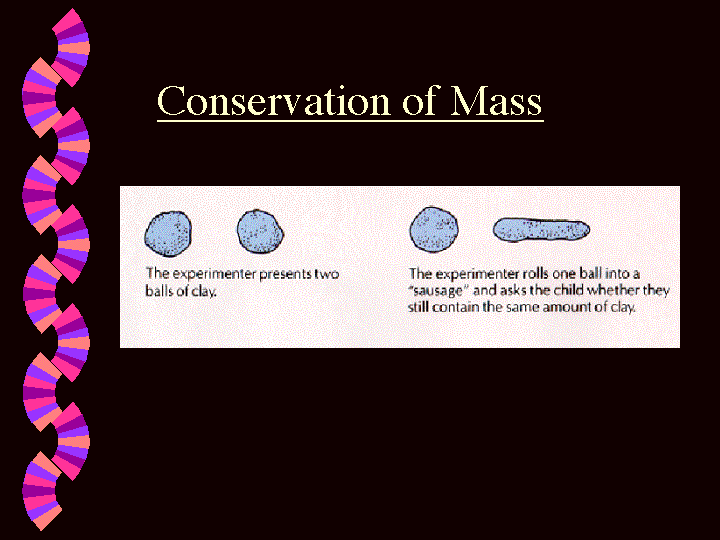
Another conservation task.
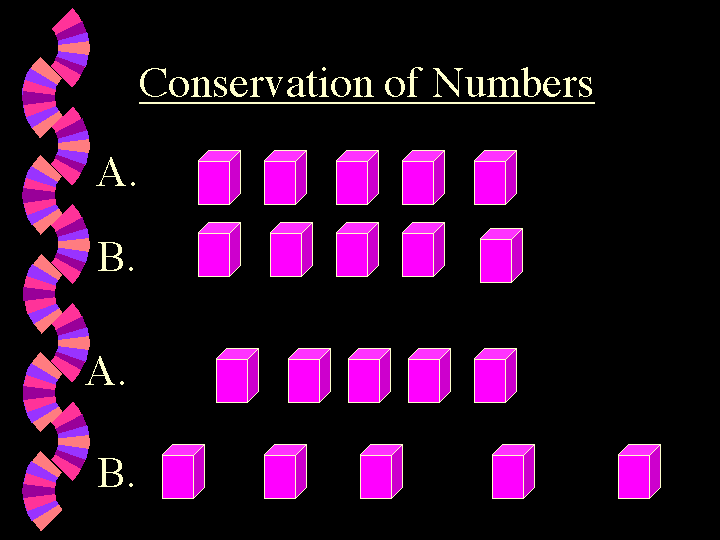
And another.
Based on the idea of lack of conservation, would a preschool child rather be given a dime or a penny?î
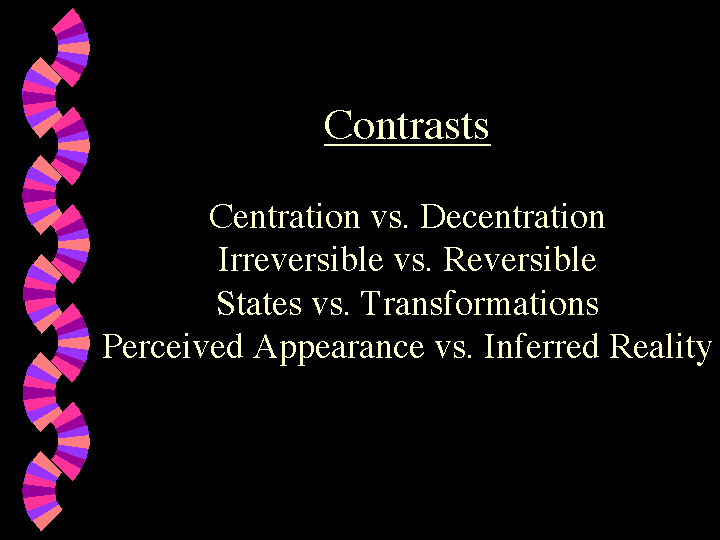
Above are the contrast between preoperational children and children who are at the concrete operational level. Children who are preoperational center on one aspect of a problem (e.g. height), see things as irreversible, and focus on states and appearance.
Children who have concrete operational though can see more than one aspect of a problem at a time, see things as reversible and changeable, can see and describe transformations, and based on that can make inferences about reality.
Why would a five year old being interviewed by a radio announcer about the home run which happened to also be a grand slam hit by his father the night before? The child said that his dad hit a home run. The announcer commented that it was also a grand slam. The child said, "No he didn't hit a grand slam, he hit a home run!"
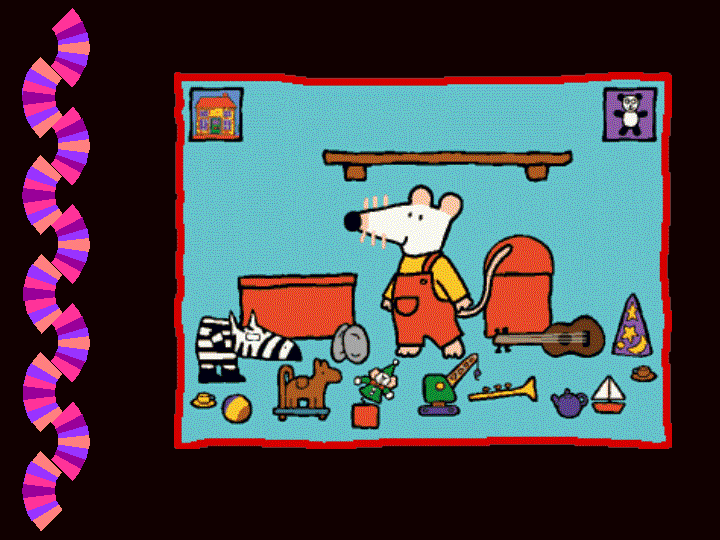
Lazy Saturday afternoon. The phone rings and (place person of choice here - minister, rabbi, mother-in-law, Better Homes and Gardens) is on their way over and your house is a wreck. You tell your preschool child to clean up their room while you madly scramble to tidy up the rest of the house. You check on your child's progress and the room is no closer to being clean than before. You sternly tell the child to clean their room. Minutes later you return and nothing has changed. You yell at your child and your child crying exclaims, "But I can't do it". Is the child being obstinate or can the child not do the task requested?
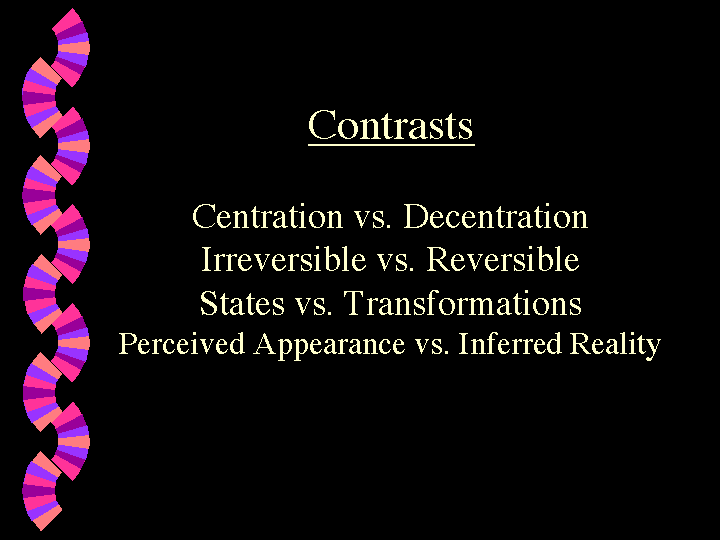
From the childís perspective, what does the messy room consist of?
1. Centration - it is one giant huge mess than can not be broken down into simple tasks.
2. The state of the room is irreversible.
3. They do not know how to make a transformation happen.
4. The perceived appearance is a hopeless task. They can not decenter to break the task down, see the mess as reversible, envision the transformation, and infer that if they task certain steps that the room will become clean.
What should the parent have done?
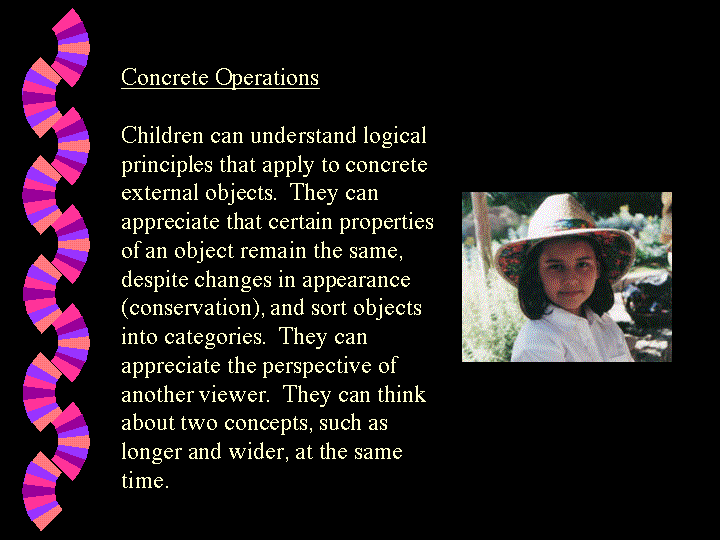
Concrete operational children now have all of the abilities described previously. However, their logic is confined to the here and now and things that are concrete in the present. Thus, basic math requires concrete operational skills whereas statistics we will find requires formal operational thought - being able to apply logic to the abstract and hypothetical.
Check out http://www.mhhe.com/socscience/devel/kid-c/resources/3-critic/cte-07.htm
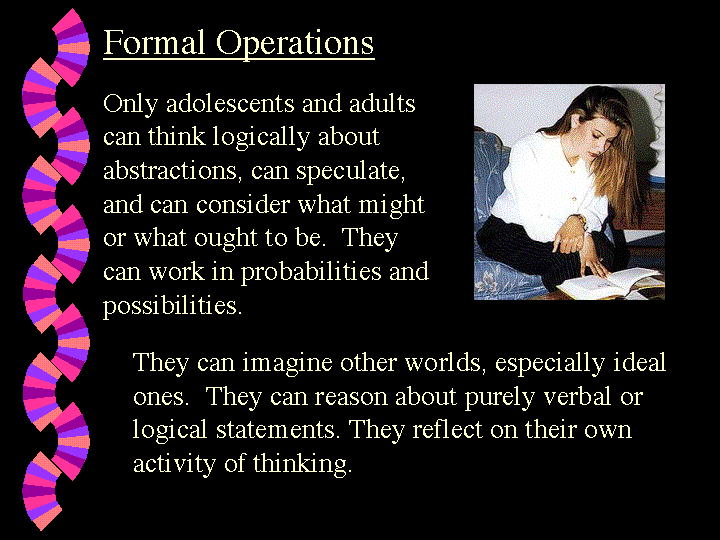
In formal operations, individuals are capable of applying logic to abstract and hypothetical situations.
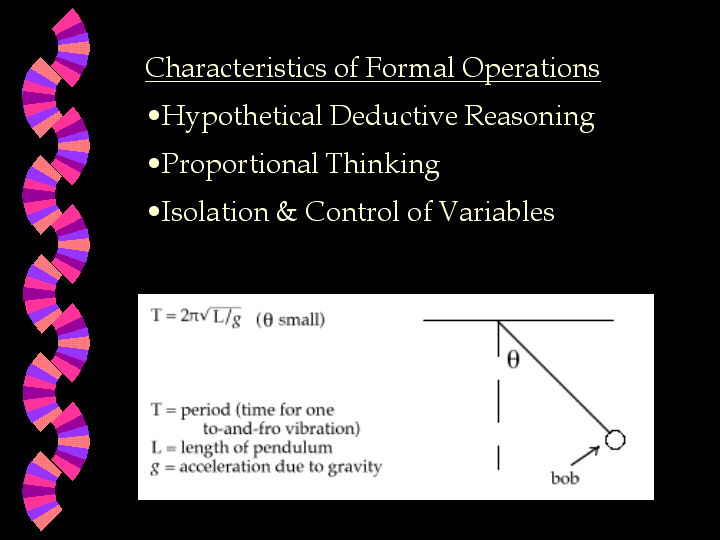
Three of the major tasks identified by Piaget as characteristic of formal operational thought include:
1. Hypothetical deductive reasoning - Being able to reason out the solution to a problem as opposed to randomly making attempts at a solution. You've seen the game on The Price is Right where Bob Barker responds with "higher" and "lower" while a contestant attempts to guess the price. A person in formal operations will create a strategy to narrow in on the price. Someone in concrete operations may randomly guess at number going higher and lower but without any strategy.
2. Proportional thinking - clearly evidenced by being able to compute ratios.
3. Being able to isolate and control variables in a study such that when the experiment is completed one knows the result is due to the independent variable under study.
A major assumption about this stage of development is that individuals think and process information like scientists. Does this describe most of the folks you know?
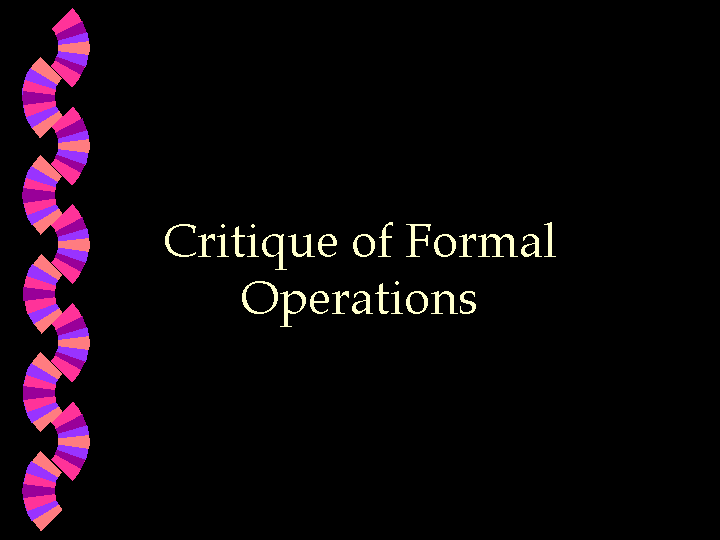
The following critique is based on the fact that most people donít think like scientists in all situations and contextual factors also impact individuals cognitive activity.
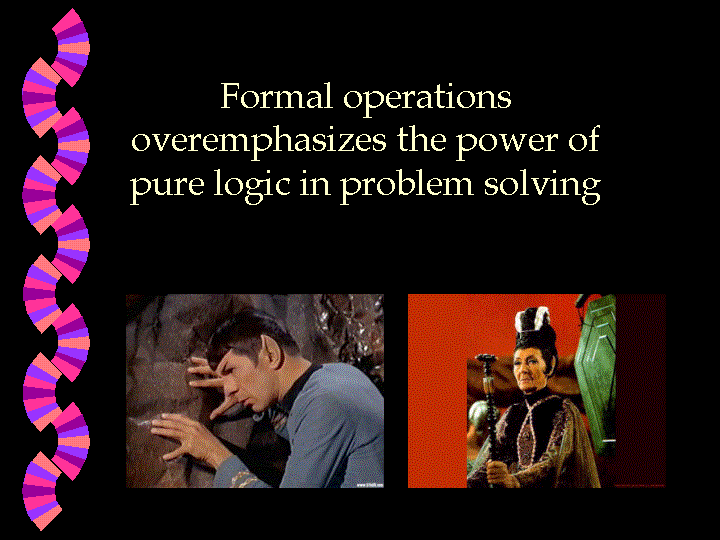
Know anyone who thinks like a Vulcan?
Piaget hypothesized that adults think like scientists when making decisions. In other words, adults use logic and carefully evaluate all variables and weigh the evidence when making decisions. However, clearly we all use a variety of decision making strategies that may not always be logical. For example, have you ever thought to yourself, "This is the logical course of action, but the non-logical course of action just 'feels' right to me". Unfortunately, there is little room for affect in problem solving in the definition of formal thinking.
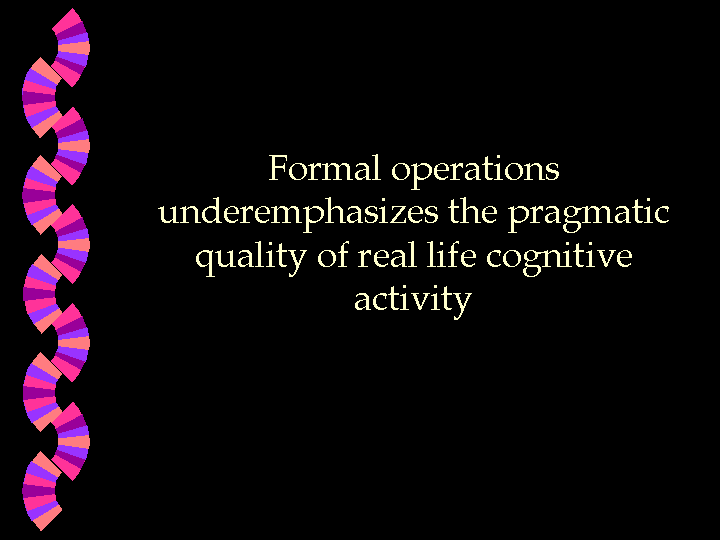
How many times in life do you make a decision based on what is pragmatic or realistic? Logically, a Harvard education will open many doors to one's future career. Pragmatically, it is far away from home, family and work, it costs a fortune, etc Pragmatism is not a factor usually addressed in the concept of formal thinking.
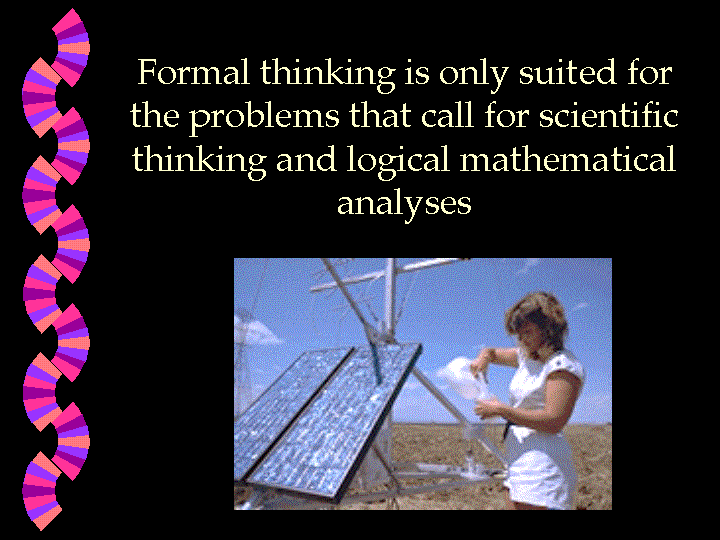
Scientific research and mathematical analyses are ideally suited to the use of formal thinking. In such a situation, the researcher can carefully control or manipulate all of the necessary variables to facilitate analysis of a particular problem. However, what if you treated your family like a scientific experiment (controlling and manipulating variables)?
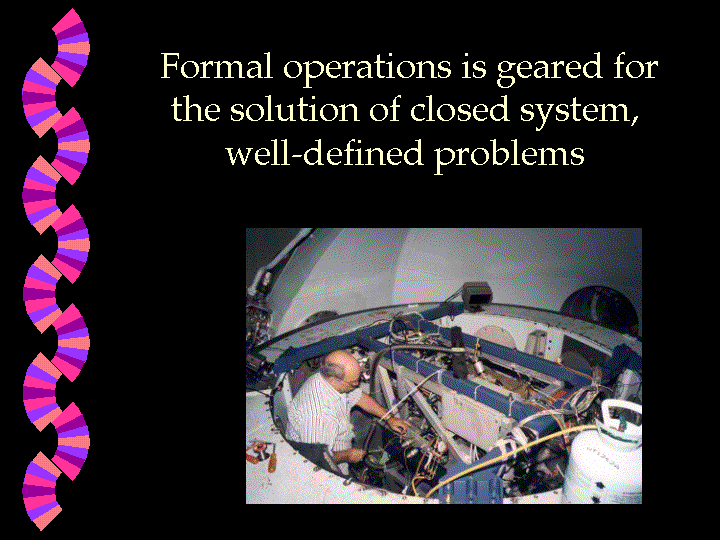
One can only control and manipulate variables in a situation where all of the factors are known and can be controlled. Does this describe most situations in life?
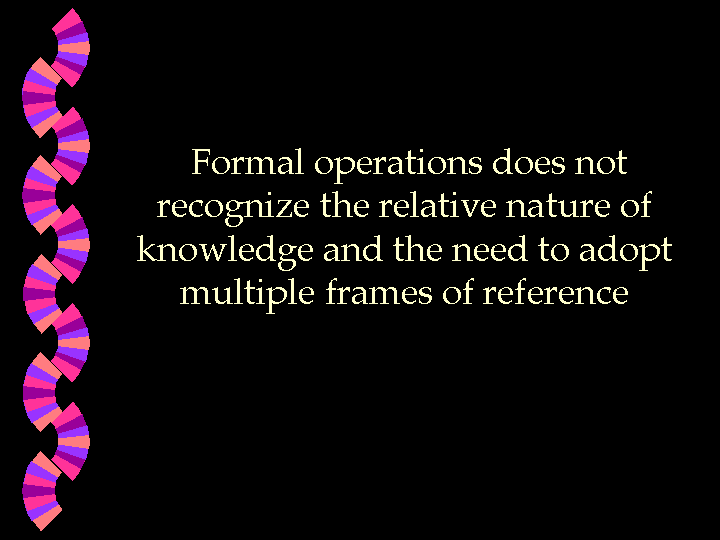
Anyone studying psychology or counseling knows that we often don't know the answer to questions and that more than one answer may be correct depending on one's perspective. Thus, depression may be the result of anger turned inwards, learned helplessness, depletions of norepinephrine or serotonin, a disparity between one's real and one's idealized self, distorted and negative thinking, result of trauma, etc. etc. etc.
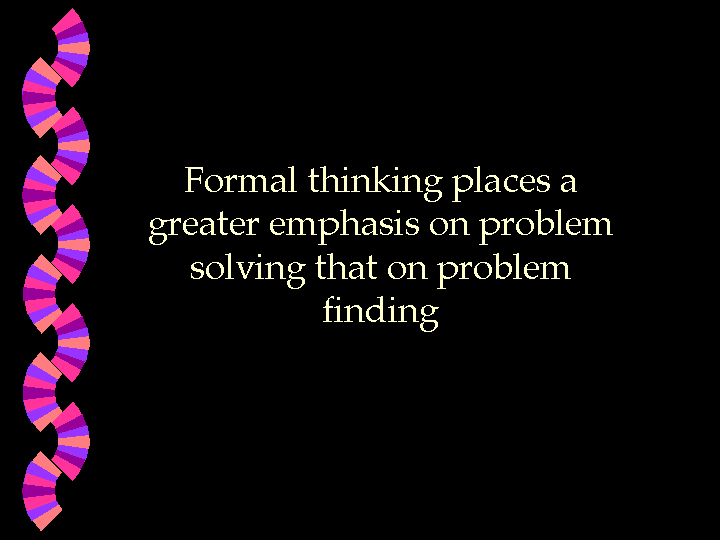
Think of some of the most interesting courses you have had during your educational career. Did they involve concrete solutions to problems or did they involve an exploration of ideas. Formal operations only concerns itself with the finding of solutions (controlling variables, solving mathematical problems, solving logic puzzles). Some of the most exciting work in research involves the discovery of questions and this is not addressed at all in the idea of formal thinking.
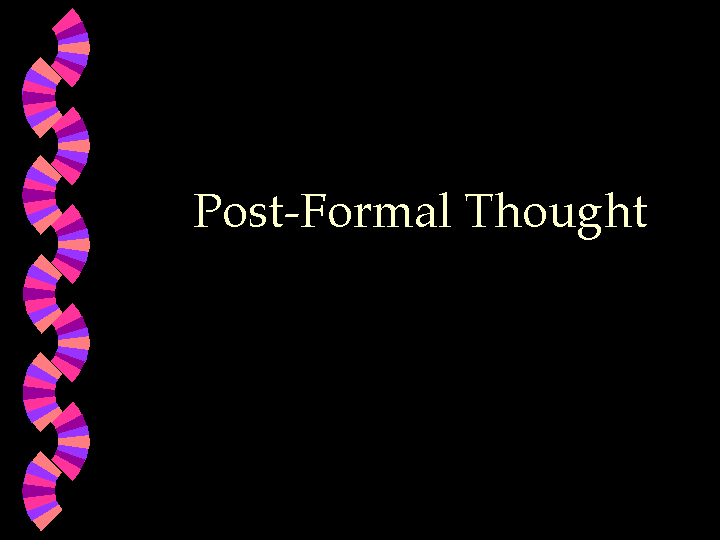
In response to the critique of formal thinking (formal operational thought), the concept of post-formal thought has been created. Some argue that it is an additional stage which follows formal operations. Others argue that it is an additional form of thought which develop somewhat concurrently with formal thinking.
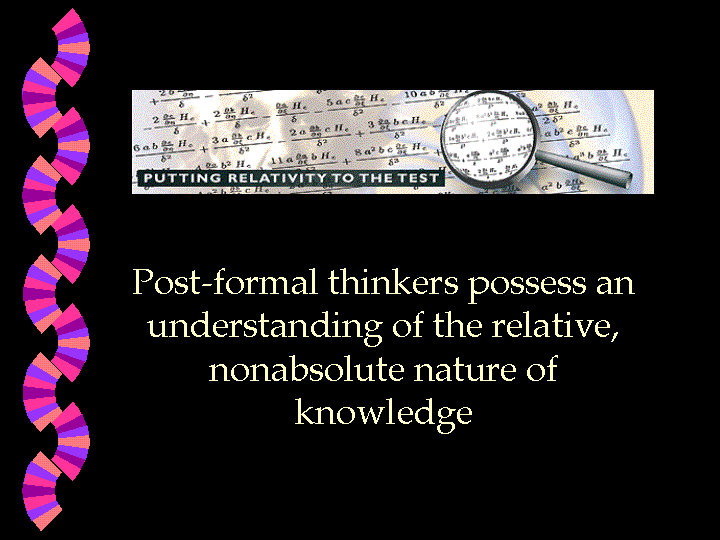
Individuals are able to see the world from multiple frames of reference, question knowledge as truth, and accept that we may not have answers for many questions.
Students exhibiting a high degree of post-formal thinking are more likely to graduate from college.
Clients with post-formal thinking skills have a better prognosis in therapy than those without these sorts of cognitive skills.
Both of the above research findings have been related to the possession of an understanding of the relative, nonabsolute nature of knowledge.
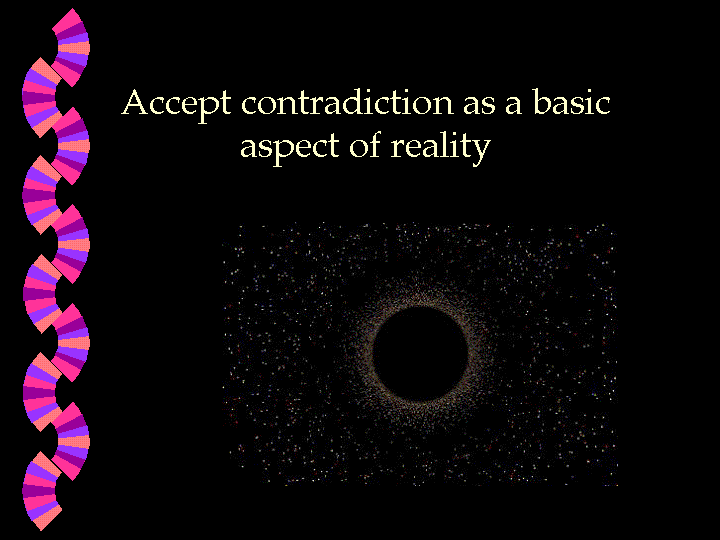
Can you love and hate someone?
Can light be both a wave and a particle?
The acceptance that contradiction and contradictory ideas as a basic aspect of reality is an aspect of post-formal thought. We will find shortly that being able to synthesize these idea (dialectic thinking) is also an aspect of post-formal thought.
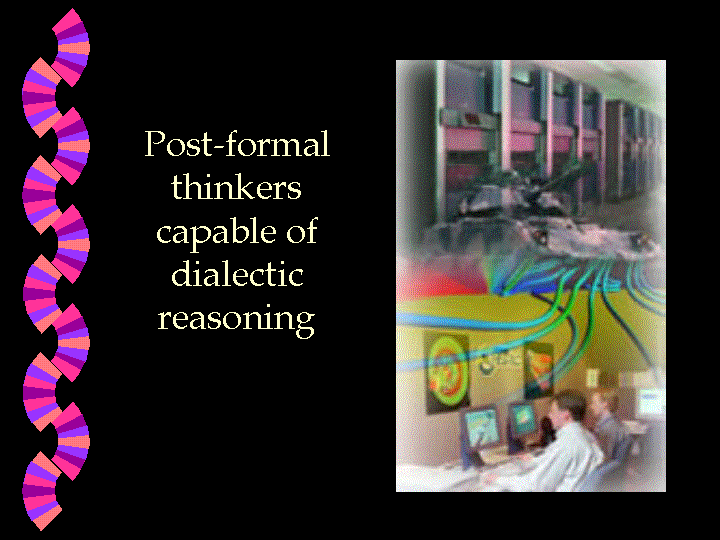
For every thesis, there is an antithesis. Dialectic reasoning involves a synthesis of these two extremes to create a new thesis.
Could someone with post-formal thought reconcile evolution and the story of creation?
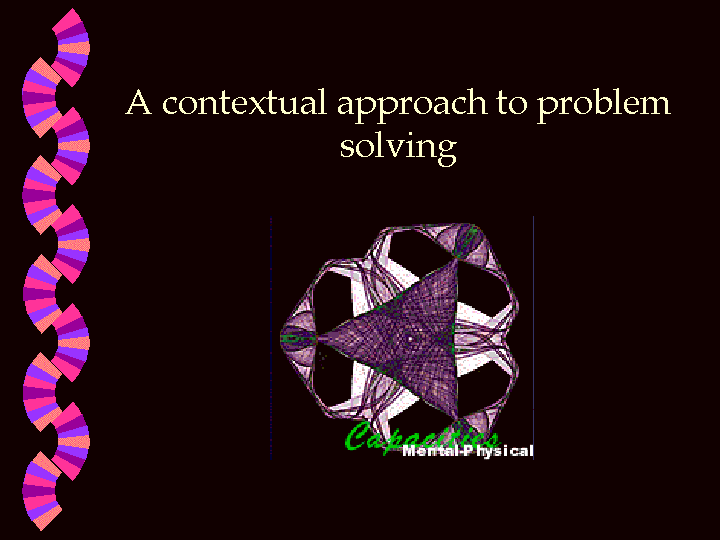
Could it be that a move from an organismic world view to a contextual world view be responsible for the addition of post-formal thought to the constructivist model?
Someone with post-formal thought will examine the context as a factor in their decision making process. Thus, for many purchases one chooses to pay cash. But, if one is unsure about the reputability of the seller and their product, one might choose to pay with a credit card? What about the context has influenced this decision? After all, the same amount of money will be spent whether using cash or credit card.
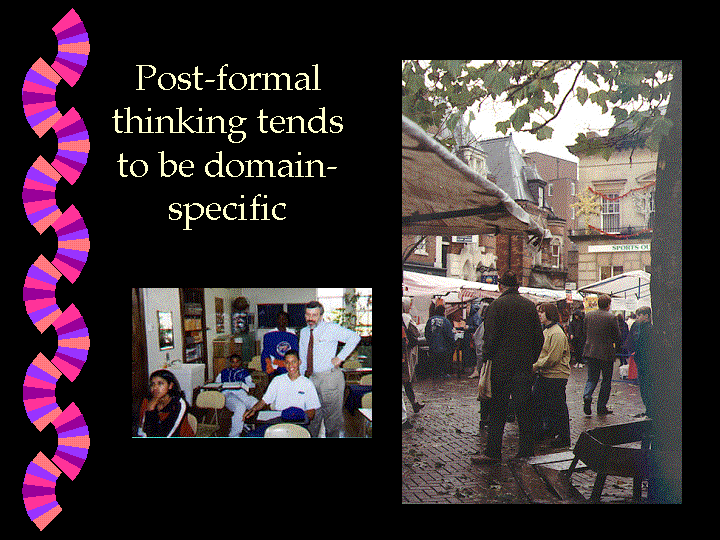
Would you use the same sore to decision making skills in an interpersonal situation as you would in the laboratory? Knowing when to use formal operational abilities and when to use post-formal thought is a characteristic of post-formal thinkers.
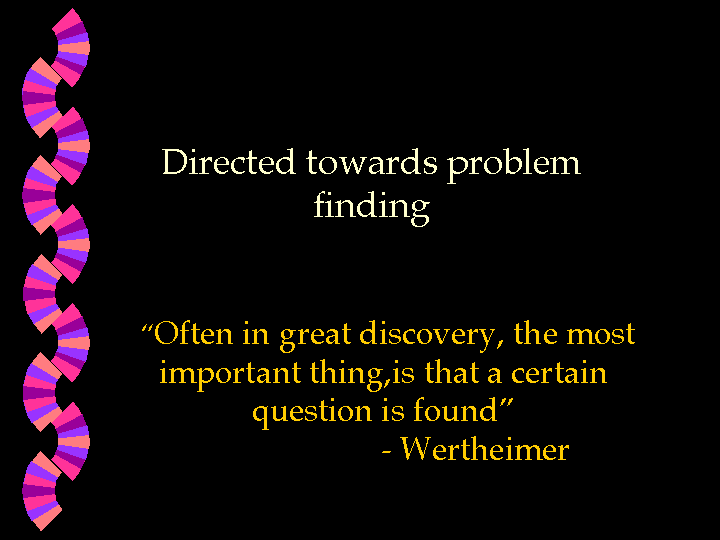
Post-formal thought often involves an exploration of questions.
For example, in the study of human development, we may not find to many solutions or absolutes. However, we will hopefully identify some of the major questions regarding human growth and development and look at some of these questions from a variety of different perspective taking into account the impact of context on the questions.
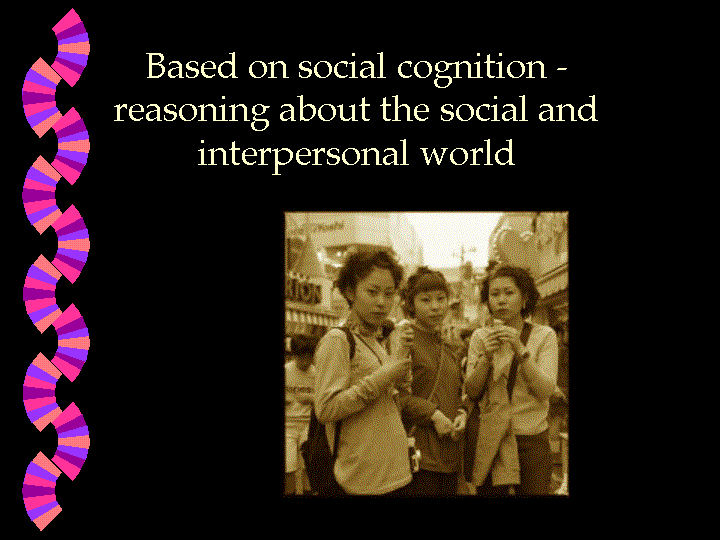
We perceive, interpret, and act on social information. We scan for facial expressions, body language, verbal response, and we change our behavior and reasoning accordingly. Have you ever come home from a bad day a work ready to spill your guts only to take one look at your spouse or partner and you say to yourself, "Clearly, now is not the time to rant about my bad day"?
Discussion Questions: